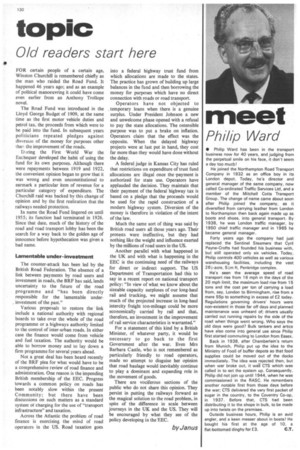topic
Page 412

If you've noticed an error in this article please click here to report it so we can fix it.
Old readers start here
FOR certain people of a certain age, Winston Churchill is remembered chiefly as the man who raided the Road Fund. It happened 46 years ago; and as an example of political manoeuvring it could have come even earlier from an Anthony Trollope novel.
The Road Fund was introduced in the Lloyd George Budget of 1909, at the same time as the first motor vehicle duties and petrol tax, the proceeds from which were to be paid into the fund. In subsequent years politicians repeated pledges against divorsion of the money for purposes other than the improvement of the roads.
D.iring the First World War the Exchequer developed the habit of using the fund for its own purposes. Although there were repayments between 1919 and 1922, the convenient opinion began to grow that it was wrong and even unconstitutional to earmark a particular item of revenue for a particular category of expenditure. The Churchill raid was backed by this change of opinion and by the first realization that the railways needed protection.
In name the Road Fund lingered on until 1955; its function had terminated in 1926. Since that date, much of the history of the road and road transport lobby has been the search for a way back to the golden age of innocence before hypothecation was given a bad name.
Lamentable under-investment The counter-attack has been led by the British Road Federation. The absence of a link between payments by road users and investment in roads, the BRF has said, lends uncertainty to the future of the road programme and "has been directly responsible for the lamentable underinvestment of the past."
Various proposals to restore the link include a national authority with regional boards to take over the whole of the road programme or a highways authority limited to the control of inter-urban roads. In either case the finance would come from vehicle and fuel taxation. The authority would be able to borrow money and to lay down a firm programme for several years ahead.
Not a great deal has been heard recently of the BRF plea for what would have to be a comprehensive review of road finance and administration. One reason is the impending British membership of the EEC. Progress towards a common policy on roads has been notably slow within the present Community; but there have been discussions on such matters as a standard system of charging for the use of "transport infrastructure" and taxation.
Across the Atlantic the problem of road finance is exercising the mind of road operators in the US. Road taxation goes into a federal highway trust fund from which allocations are made to the states. The practice has grown of building up large balances in the fund and then borrowing the money for purposes which have no direct connection with roads or road transport.
Operators have not objected to temporary loans when there is a genuine surplus. Under President Johnson a new and unwelcome phase opened with a refusal to pay the state allocations. The ostensible purpose was to put a brake on inflation. Operators claim that the effect was the opposite. When the delayed highway projects were at last put in hand, they cost far more than they would have done without the delay.
A federal judge in Kansas City has ruled that restrictions on expenditure of trust fund allocations are illegal once the payment is authorized for state use. Operators have applauded the decision. They maintain that their payment of the federal highway tax is based on a pledge that the proceeds would be used for the rapid construction of a modern highway system. Diversion of the money is therefore in violation of the intent of the law.
Much the same sort of thing was said by British road users all those years ago. Their protests were ineffective, but they had nothing like the weight and influence exerted by the millions of road users in the US.
Another parallel with what happened in the UK and with what is happening in the EEC is the continuing need of the railways for direct or indirect support. The US Department of Transportation had this to say in a recent report on national transport policy: "In view of what we know about the sizeable capacity surpluses of our long-haul rail and trucking, we might assume that much of the projected increase in long-haul intercity freight ton-mileage could be more economically carried by rail and that, therefore, an investment in the improvement of rail service characteristics is warranted."
For a statement of this kind by a British Minister, of whatever party, it would be necessary to go back to the first Government after the war. Even Mrs Barbara Castle, who is not remembered as particularly friendly to road operators, made no attempt to disguise her opinion that road haulage would inevitably continue to play a dominant and expanding role in the movement of goods.
There are vociferous sections of the public who do not share this opinion. They persist in putting the railways forward as the magical solution to the road problem, in spite of the difference in scale between journeys in the UK and the US. They will be encouraged by what they see of the policy developing in the EEC.
by Janus
































































































































































































































































































































































































































































































































